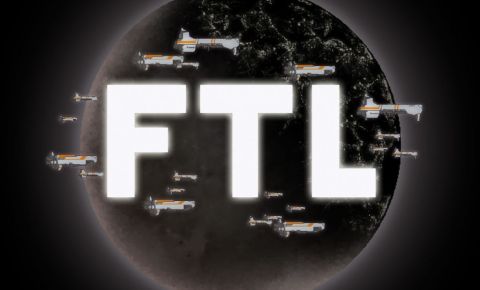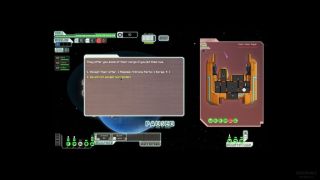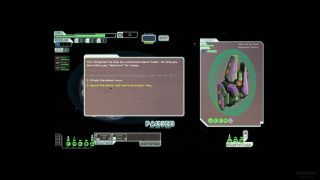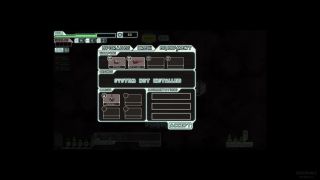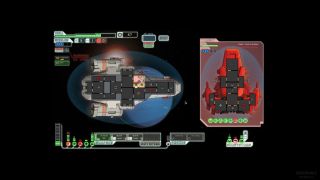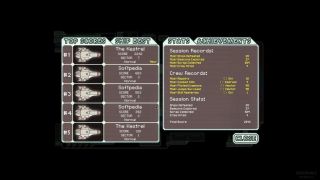Jump. After the initial confusing feeling generated by hyperspace, the trusty crew gets back to their stations and the systems of the valiant ship Softpedia hum with energy ready for any surprise that the universe can spring.
Out of the meteor cloud a ship appears, quickly revealing itself to be part of the Rebel fleet, which means a confrontation is unavoidable.
I take power out of the sickbay and the oxygen production center (I really need to upgrade my power plant) and re-route it towards weapons, which allows me to begin using both my rocket launcher and my burst laser.
I fire the missile, which ignores shielding, in order to knock out the weapons subsystem of the enemy, while waiting for my laser to get to full power, but my entire battle plan is quickly ripped to pieces when I am alerted that enemies are on my vessel.
Only now do I notice the teleporter the Rebels have and I am suddenly terrified, as two enemies quickly kill one of my crew members and begin destroying the shield system he was manning.
I rush the rest of my crew in order to stop them, trying to keep three in the fight at the same time while another one recuperates in the infirmary (yes, I have once again powered it up) but I am losing the battle and I know it.
I quit to the main menu, not ready to accept defeat, and get ready to start another game.
Failed campaign number 18 – the lesson I learned is that depriving boarding enemies of oxygen might be a better tactics than trying to stand up to them physically.
This is just one of the stories that FTL, the new roguelike from Subset Games, can tell and a good example of how the game manages to mix the main roguelike concepts with a number of clear strategy oriented mechanics to create an experience where the player feels like he is always making educated guesses about the future and gambling his progress away with each jump.
Story
FTL is, in many ways, a roguelike game and that means that there’s little in the way of a narrative created by the developers themselves.
Basically the ship you are running has crucial information for the Federation and in order to deliver it to the Loyalist forces you need to stay constantly ahead of the pursuing Rebel forces that are trying to get their hands on it.
The good thing about the limited narrative is that it allows the players to step in and create their own stories, starring the various crew members and the ship they run (which can be named in order to increase the emotional connection).
The problem with the minimal story of FTL is that it hampers the development of the game universe, which feels like a mash-up of familiar elements taken from Star Trek and Battelstar Galactica but with no added freshness.
The Rockmen are a good example of how bland FTL can be and, while I understand that resources needed to be carefully weighted during development, the game could have really benefitted from some stronger characterization of the various involved factions.
Gameplay
FTL is a game of turns and panic, of exhilaration and triumph and everything is built around incredibly simple mechanics.
The ship you control has systems, ranging from power generation to shields and weapons, and a crew, with initially three people in the standard version of the ship, although more can be obtained as the campaign progresses.
The ship also has a hull strength that needs to be kept up, missiles, drones and fuel as resources and as you progress they become increasingly important for survival.
As the ship jumps from location to location you can either find empty space (which at times is oddly satisfying), a multiple choice situation or an enemy to fight.
Once a battle starts the game switches to real time and the player needs to manage power output and other systems in order to take out the enemy or force him to surrender.
It’s simple on paper but in FTL everything can turn frantic incredibly fast and the game really manages to deliver the same feeling that you got when watching Captain Picard manage a crippled Enterprise in one of the fight heavy episodes of Star Trek: The Next Generation.
One moment I was easily winning a battle against an enemy scout, his shields down and his weapons on yellow while the second I was dealing with a crack in the hull and fires started by their last missile.
To make matters worse, I had powered down the infirmary in the middle of the fight to power up all my weapons and I failed to observe that, which meant that I lost two of my crew members pretty quickly and was forced to quit the game and start a new one.
The roguelike structure of FTL means that the game can be incredibly hard and frustrating but winning is not the actual goal here, survival is.
As the game progresses, the weak ship that started the trip will get access to drones, better weapons and superior shields and some encounter will become trivial but there’s always the risk of some unexpected threat, like a slave ship with teleporters that sends over a boarding party that you cannot defend against.
FTL also has a meta-game, which relies on scores and in-game quests to offer the player who sticks with the game more ships to unlock and then try out.
Some of them includes equipment that can be otherwise pretty hard to come by and open up new play styles that will challenge even the most hardened of space strategy aficionados.
Graphics and audio
FTL is the result of a Kickstarter project and the entire team that created it is made up of two people, one of whom was in charge of the entire look of the game.
Given the resources that were linked to the game, FTL looks good and manages to offer and explain information on the screen quickly and efficiently, but some gamers might be annoyed by the lack of actual movement in the game and by the primitive effects linked to the combat.
The biggest problem with the game is the sound design, which manages to be both repetitive and uninspiring.
Getting a soundtrack of anything from Star Trek to Battlestar Galactica to Farscape and running it in place of what FTL offers is a good way of adding some real emotion to the game.
The game can be sparse at times but as long as you invest a little in the concept each jump becomes a heart pounding moment of suspense worthy of the best series on TV and each choice and battle seems to carry the weight of the fate of the entire Federation. I can only hope that the money that the developers get from the sale of FTL and another Kickstarter drive will allow them to get the resources required to expand their team a little and the ideas of the current game in innovative ways. The best way to pick up FTL at the moment is to head to the GOG website and get it there with a price cut of 10 percent from the 9.99 dollars or Euro it usually costs. The game can also be bought directly from the website of developer Subset Games and from Steam.
The Good
The Bad
Conclusion
 14 DAY TRIAL //
14 DAY TRIAL // 